Category: Uncategorized
Importance of Empowering Youth with Community Programs in Colorado
First Tee gives opportunities for youth to not only get daily exercise and build skills but to also have an empowering outlet for their self-confidence and future. At the First Tee – Colorado Rocky Mountains, we offer a unique experience for Colorado youth that is focused on much more than just skill-building in golf. Through our community programs in Colorado, we are able to empower local youth of all ages.
What Does it Mean to ‘Empower’ Youth?
Youth empowerment is one of the most important factors in creating positive outcomes for individuals and communities. In fact, research suggests that empowering youth leads to better academic performance, health, economic success, and civic participation.
But what exactly does it mean to empower youth? And why do we need to engage them? Let’s dive into these questions a little further.
Good Educational Standards
Kids have great potential in their younger years and they must be given opportunities and support to realize that potential. This is why we must ensure that our schools provide quality education standards. In addition, we must give opportunities to those who come from low-income families. We must take care of our children and educate them properly. They must learn about themselves, their culture, and their environment. When kids receive relevant education in their lives, they’ll feel more empowered, capable, and ready to take on the world.
Young kids must be taught how to respect each other and live together peacefully. They must know what makes them happy and what they want out of life. Kids must be encouraged to dream big dreams and set goals. And they must be supported to achieve their full potential. Through a golf community program, Colorado youth can get the educational support and empowerment to effectively support them.
Empowering Youth for the Future
The world today is full of young people who are disenchanted with the status quo. The younger generations want to change – and they’re willing to make it happen themselves. But how do we help those individuals find their voices? How do we give them the tools they need to take control of their future?
At First Tee, we believe that education empowers youth and that without it, there is no hope. We see education as a tool for social transformation and a catalyst for economic growth. In fact, we think that education is what will enable us to realize the aspirations of our country’s youth.
Benefits of Youth Empowerment to Society
There are numerous benefits of youth empowerment to society. Youth empowerment is the process where a young person gets empowered to take charge of their life and make decisions about what they want to do in life. This gives younger individuals confidence and motivation to achieve goals.
In today’s world, there are lots of opportunities for youth to develop themselves; however, most younger generations don’t use them because of a lack of knowledge, skills, resources, etc. Youth empowerment helps in overcoming such problems.
Here are just a few of the many societal benefits of youth empowerment:
Youth empowerment leads to better performance in schools and colleges
Students can learn how to manage their time effectively, prioritize tasks, and complete assignments on time when they feel empowered and motivated. Young community programs, like sports clubs or leagues, can offer those benefits for your kids. They will also understand the value of education and strive hard to improve their grades. These qualities help students succeed in college and lead to good career prospects.
Youth empowerment improves physical health
Young people are encouraged to participate in sports activities, exercise regularly, eat healthy food, and sleep properly. All these factors contribute to improved mental and physical health.
Youth empowerment reduces crime rates
Most crimes committed by youths are related to drugs, alcohol, and/or gangs. By encouraging youths to pursue alternative careers and engage in productive activities like working, studying, volunteering, etc., cities can enjoy reduced crime rates.
Youth empowerment creates a positive impact on the environment
Young people are taught to recycle waste products, use public transportation, and practice sustainable living. In addition, they are encouraged to protect nature and wildlife. As a result, the environment becomes cleaner, greener, and healthier.
First Tee is Empowering Colorado Youth Through Community Programs.
Youth empowerment has so many benefits to the child and community as a whole. At the First Tee – Colorado Rocky Mountains, we offer an array of engaging, educational, and physically challenging youth golf programs. Through these initiatives, we have empowered kids, teens, and young adults to make the most of their lives through productive means.
Contact First Tee today to learn more about our community programs throughout Colorado.
Looking for Junior Golf Lessons in Colorado?
Golf is an amazing sport that offers tons of benefits for younger and older players alike. You can learn new skills, build new friendships, and get great exercise in the process. That’s why it’s a good idea to help kids and teens learn the sport while they’re young. Are you looking to sign up your children for junior golf lessons in Colorado? If yes, then you’ve come to the right place.
We’ll cover some of the ways that you can find the best program for your child and what you need to keep in mind when searching for youth instructors.
Finding the Best Junior Golf Lessons in Colorado For Your Child
Junior golf lessons are a great way to help your child improve their game and get them ready for high school or college golf. You will be able to see how quickly they progress as they learn new skills and techniques from an instructor who has experience teaching kids. From private instruction to group classes, there are plenty of options out there for junior golf. Here are some things to consider when searching for junior golf lessons in Colorado:
Age Groups
What is your child’s age? Some schools or community programs may only teach children up until about 14 years old, while others may go all the way through high school. The younger your child is, the less expensive it will be to take junior golf lessons.
Weekly Commitment
How many hours per week would you like your child to spend taking junior golf lessons? Most extra-curricular after-school programs will outline a set number of hours each week that your child needs to practice. Make sure that this number is enough to keep your child engaged and learning. And don’t forget to take into your schedule too. If the weekly commitment does not align with your schedule or your child’s needs, then you might need to look at other options.
Private Or Group?
Will your child prefer private lessons or group lessons? Private lessons allow your child to work on specific areas of your child’s game with an individualized lesson plan. Group lessons usually involve several students working together under the supervision of an experienced teacher. Both types of lessons are beneficial, but they each come with their own pros and cons.
Private lessons may be slightly more expensive, but your child receives more personalized instruction. Group lessons will likely be more affordable and may provide opportunities for socialization, but they may not receive as much attention in a group setting.
Already Playing?
Is your child already playing golf? If your child plays golf, they will likely be better suited for more advanced junior golf lessons. However, if your child doesn’t currently play golf, don’t worry! There are plenty of opportunities for non-golfers to join in on the fun. Many school programs and golf instructor groups offer junior golf clinics where your child can try out different clubs and equipment to get more familiar. They can even use these clinics as a chance to meet other players and build friendships.
Why Choose First Tee – Colorado Rocky Mountains?
As a non-profit organization, we aim to provide high-quality educational programs and golf skills instruction. We’ve structured our approach to golf instruction to empower younger players, teach them life-long skills, and embrace the sport.
We help children develop the strength of character they need to face life’s challenges. We integrate life skills curriculum into the game of golf to create learning experiences that build children’s confidence, resilience, and inner strength.
Throughout the years, First Tee has seen many successful students leave our program with skills and relationships that last a lifetime. You can read more about our student success stories on our stories page.
Get Started with First Tee – Colorado Rocky Mountains
Register your child today and get started with junior golf lessons in Colorado.
The Key to Setting Reachable Goals
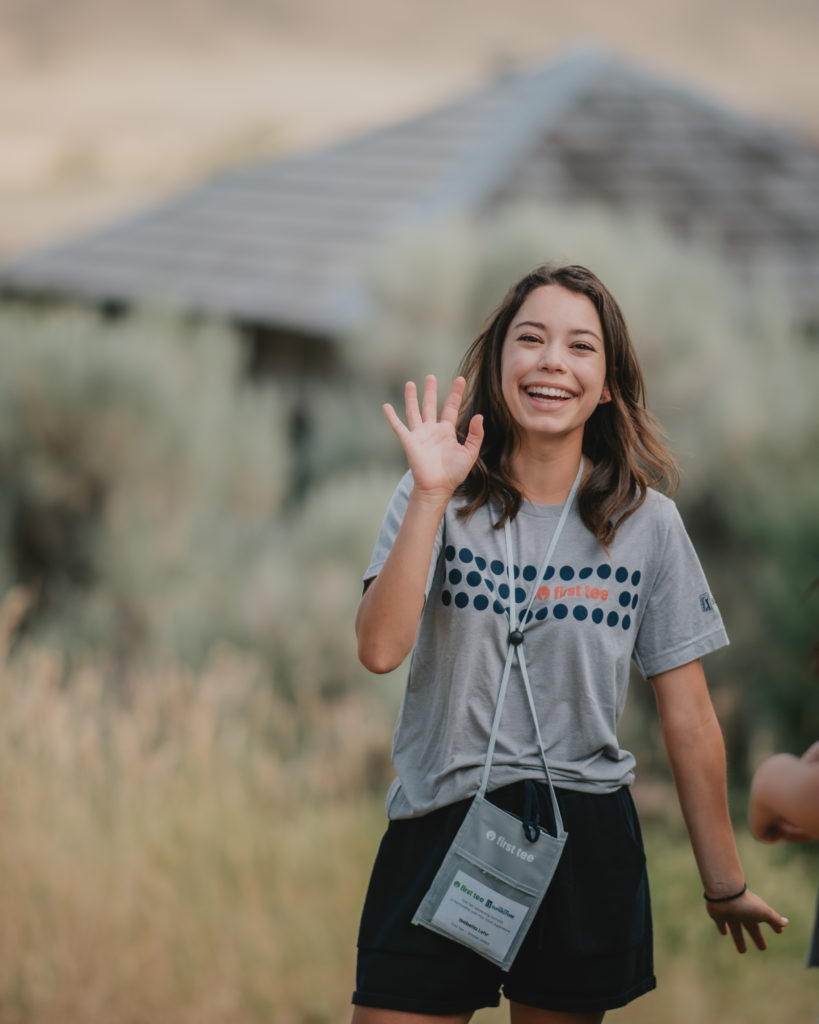
Have you ever thought about your achievements in life? What were the dreams and ambitions that you wanted to work towards? How did you get there? At First Tee, these are the type of questions we propose to kids and teens to help them understand the process of attaining goals; but to reach their goal, they must first understand how goals are formulated.
A goal is something that you want to do, be or have, but it’s not something that you can do, be or have right at this moment. It’s something you must work to get in the future, and you can apply that to any challenge in life. For example, if your child wants to achieve Honor Roll and receive all As and Bs in school this year, what would that require them to do? They would need to do well on tests and assignments. How would they accomplish that? Encourage them to take good notes, turn in their work on time, and study for their tests.
For kids, having guidelines or tools can effectively help them identify their goals and make them feel comfortable about reaching them. At First Tee, we utilize four guidelines to do this. Talk to your child about the dreams they currently have and try these out for yourself.
Four Guidelines for Setting a Reachable Goal:
- The goal is Positive:
- I want to achieve a passing score of 80% or higher vs. I don’t want to fail this test
- The goal is Important to You:
- The goal needs to be important to you, not to someone else. You should be able to explain why you want to achieve it and why it will make a difference for you.
- The goal is Specific:
- You want to know exactly what you’re working toward.
- The goal is Under your Control:
- Your efforts will allow you to achieve this goal vs. Something that is out of your control like becoming famous or winning the lottery.
Goal setting is a strategy kids and teens will apply for the rest of their life. When we set our goals, we want to be very clear about them so that we have the best chance to achieve them. The key to remember is that goals come in all shapes and sizes. Just because it doesn’t work for someone else doesn’t mean that you can’t achieve it. Your kids will learn from both their achievements and setbacks, but as they begin to set personal goals, they will learn and grow in ways that you did not think possible.
Want to get involved with what we are building at First Tee? Click here to find out more.
Why Girls + Growing through Golf = Empowerment
Did you know more than 80 percent of First Tee chapters offer programming specifically for girls?
“Growing up playing golf, I never imagined being in the golf industry,” said Rebecca Caimano, assistant executive director at First Tee — Greater Philadelphia, who joined the chapter in 2011 to help grow its girls programming. “It was tough being the only female who played golf.”
Now, Rebecca is among thousands of leaders/coaches who are involved in First Tee.
First Tee views golf as a metaphor for life. It’s not the score that counts, but what you learn along the way. The game is a perfect practice ground for learning skills that extend far beyond the course. Let’s face it, digging deep when things get tough is a natural part of our sport – and life – experiences.
As we celebrate our 25th anniversary (& Women’s Golf Day), First Tee is proud of the role we’re playing in helping more young girls embrace the sport and what they can learn through it. Thanks to many female coaches and leaders throughout our network – like Rebecca – we are a safe place where girls can come, be themselves and learn from coaches and role models on the course and in the business world.
Also, thanks to organizations like USGA (a Founding Partner), LPGA-USGA Girls Golf and John Deere, sponsor of the Drive Your Future Academy, a national leadership development opportunity for female First Tee teens, we continue to intentionally offer opportunities for girls’ personal growth and development in many ways.
Empowering girls for a brighter future
While many First Tee alumnae have gone on to work in golf, others have excelled in different areas, including medicine, journalism and public affairs. And we think that’s great for them, and for the world around us.
Studies have shown that women leaders are engaging and collaborative, yet it hasn’t always been easy for women to break into many top leadership roles. Golf can help.
Ninety percent of Fortune 500 CEOs play golf, according to the PGA of America, and more than half of all businesspeople believe golf is a valuable networking tool. Women executives believe that a background in sport was helpful to career advancement because it prepared them to work better in teams, and behaviors and techniques can be applied to the corporate setting (Women’s Sports Foundation).
First Tee teaches valuable life skills that can help girls as they become leaders. Through our personal growth and junior golf programs, we encourage girls to build self-confidence that they’ll carry with them into their future.
“I originally stuck with it [golf] because I wanted to beat my brother,” Rebecca continued. “And now, here I am, using a sport that changed my life to change others.”
Now, that’s girl power.
Approximately 25% of First Tee’s coaches are women, and we’d love to increase that number! If you are interested or know of a passionate female leader in your life, please point her here to get involved: https://firsttee.org/get-involved/coach-volunteer/
Catching Up With the Inaugural First Tee Scholar
Sixteen-year-old First Tee – Lake County (Hammond, Ind.) participant, Steven Outlaw, was notified during the 2001 First Tee Network Summit, the annual gathering of those within the First Tee network, that he was going to have to make his speech earlier than originally scheduled. The events to follow happened in a way that only fate decides.
Steven describes it as “being in the right place at the right time.” Using one of the first skills instilled into First Tee participants, as well as taught within his own household, on how to properly introduce yourself to others, Steven walked right up to one of the other speakers of the evening, former president of Georgetown College, Dr. William Crouch, and shook his hand. Steven’s demeanor stood out to Dr. Crouch and gave him quite the idea.
Following Steven’s speech, Dr. Crouch scrapped his own prepared comments and surprised Steven with a full scholarship to Georgetown College and news that he planned to provide a full scholarship to First Tee participants every year following. This full-ride scholarship would alleviate the financial burden of furthering Steven’s education.
Bob Krause, former vice president of institutional advancement at Kansas State University, followed suit with Dr. Crouch’s pledge. The First Tee Scholars Program was born and set to begin by 2003 with the inaugural class of Scholars, many of whom Steven is still in touch with today.
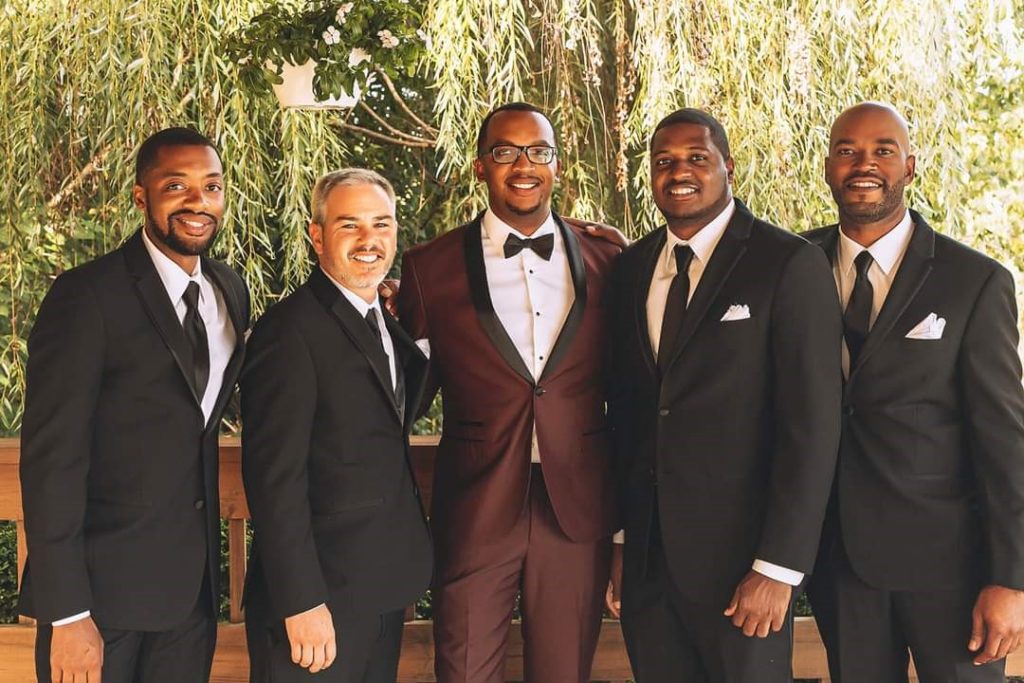
L to R: Christopher Hawkins, First Tee – Metro Atlanta alumnus and First Tee Scholar Class of 2003; Adam Ruegg, Troon Golf; Steven Outlaw, First Tee – Lake County alumnus and inaugural First Tee Scholar; Rod Jackson, First Tee – Metro Atlanta alumnus; Brandon White, current Program Director First Tee – Lake County.
As the inaugural First Tee Scholar, Steven graduated from Georgetown College with a degree in political science. After college, he enrolled in the PGA, PGM Accelerated Program. After completing two levels of the program, he secured an internship with Troon Golf, a leading golf management company. He has since worked with Troon Golf for nearly 15 years, starting in Arizona and traveling overseas to work in the Middle East, and in Malaysia managing The Els Club Teluk Datai (rated #83 in the world by Golf Digest in 2016).
More recently, Steven serves as the PGA Director of Golf at Wickenburg Ranch Golf & Social Club, managed by Troon Golf. Steven has been a PGA Class A Professional for more than 10 years and currently serves on the Southwest Section PGA Board of Directors and is very active with Troon’s D&I Council. Going forward, Steven aspires to ascend the ranks in the PGA of America, with a passion specifically around diversity, equity and inclusion and positive change within the game of golf.
Though Steven had numerous amazing opportunities during his time as a First Tee participant, he now prides himself in exploring what he can do for First Tee as an adult. He works closely with First Tee – Lake County, often supplying the chapter with donations.
“These opportunities would not have been possible without First Tee and the core values instilled in me such as perseverance and confidence. Much of what I learned during my time with First Tee I use now to strengthen and empower my team. I am forever grateful and honored to be part of such a great organization. I look forward to the future of First Tee and the path they will pave for the next generation.”
Eleven years after Steven’s speech, the First Tee Scholars Program continues to thrive. It has since received a face-lift following Greg McLaughlin being named First Tee CEO in 2019.
Relaunching officially in 2020, President George W. Bush, honorary First Tee chair, congratulated the first class of the revamped program. First Tee College Scholarship Program now extends its impact to alumni beyond financial support, providing personal and professional development throughout their post-graduate careers.
Each of the Scholars is paired with a dedicated, trained adult mentor who helps encourage and guide them throughout the college experience, including virtual and in-person meetups. The program also provides professional development workshops held in-person throughout the year, and up to $5,000 per year toward tuition.
“First Tee aims to inspire and empower every young person in the program to set goals and begin pursuing them,” said McLaughlin. “The First Tee College Scholarship Program is intended to motivate young people to stay in the program and support alumni as they matriculate through the college.”
In recognition of First Tee’s 25th anniversary, the Class of 2022 includes 25 First Tee Scholars. This time, Steven Outlaw has turned the tables, joining as a mentor to one of the Scholars.
“I was extremely fortunate to be surrounded by great professionals as I progressed through my time with the First Tee. These individuals helped me grow not only in golf, but personally and professionally. I consider myself lucky to be able to return the favor to the next generation!”
We believe in helping youth succeed – on the golf course and in life. Learn more about our programs and how you can get involved.
Three Ways to Help Kids Develop a Positive Self Identity
Experiences are our greatest teachers. They shape how we treat others, how we see the world around us, and how we view ourselves. How we view ourselves is also known as our self identity and is defined as the qualities and potential you possess. It can influence the choices you make, the attitude you have day-to-day, and ultimately, it becomes your inner voice. For youth especially, a positive self identity can have a massive impact on who they become as adults. There are many ways parents can help their kids develop a positive self identity, and at First Tee we pride ourselves in nurturing a positive self identity for youth. Here are three ways you can help your kids develop a positive self identity inspired by our core values.
Live Your Values
Kids watch and learn from the adults in their lives every day. Studying their actions and responses, they develop their identity based on their guardians and the other mentors in their life. If you live according to the values you want your kids to have, then they are more likely to absorb that into their own independent lives. That being said, having a mentor is a great way to ensure this happens. At First Tee,youth learn from their coaches by:
- Treating others with respect and honesty
- Experiencing the value of teamwork, not just by being told to act as a team but by witnessing their coach lead with teamwork.
- Watching their coaches exercise positive self talk and kindness to others around them brings out the best in themselves and their self identity.
Create a Culture of Acceptance
When there is no room for failure there is no room for growth. Fostering an environment that is not only safe for kids to fail but encourages them to try again, helps kids develop a strong sense of self. Acceptance also transcends just failure; it also means that every person, regardless of their background, is welcome. We work together to actively create a space of belonging for every kid— no matter what walk of life. Through example we encourage youth to accept their team members for who they are, treat each other with kindness, and create that culture of acceptance everywhere, so that when they reflect on themselves and their own identity they treat themselves with the same level of respect and positivity that they give others.
Empowerment Through Experiences
For kids, experiences shape their inner voice that gives them confidence and character. Not all experiences in life are easy, and when we empower youth to persevere and stay true to themselves, we bring out the best that’s inside of them. First Tee exists to enable kids to build the strength of character that empowers them through a lifetime of new challenges. As time goes on, that empowerment creates a strong sense of self, and encourages a positive self identity even in difficult situations.
Though a positive self identity may seem like something only some people are born with, it is really something that can be cultivated through leading by example, an open culture of acceptance, and consistent empowerment through all experiences. What do you want your child’s inner voice to sound like when they grow up? Nurturing their self identity can make all the difference in that. We guide kids and teens to strengthen what’s inside and put it into action. If you are interested in getting your child involved with First Tee, you can learn more and sign up today!
Building Understanding, Trust, and Empathy with Active Listening
Every conversation can be an opportunity to learn something new, build trust with someone, and deepen connections. This happens when we build the skill of active listening and learn to treat listening as an active process – not a passive one.
What is Active Listening?
Active listening is a way of listening and responding to another person that improves mutual understanding. It’s about being present, listening to understand (not respond), and showing active interest and engagement in the dialogue.
Why does it matter?
Active listening is an important skill for all of us to cultivate. Not only is it an important leadership skill, it has been shown to promote mindful thinking, can reduce anxiety and depression, helps build relationships and can promote empathy.
How do we practice it?
At First Tee, we use a process called A-L-R to help build connection through active listening. This helps us to deepen conversations, keep them going, and get the most out of them. Here’s how A-L-R works:
- Asking questions: Asking thoughtful questions is not only a way you can keep the conversation going, but it gives you a deeper understanding of the person or topic you are engaging with.
- Helpful Tip: Be curious. Try asking questions that dig a bit deeper: How did they feel in that moment? What was going on in their minds during that experience? What would they do differently the next time? These make the conversation richer, rather than closed-ended questions that are typically answered with a simple Yes or No.
- Listening to understand: When you ask a question, it is important to listen carefully to what the person is saying. We can sometimes be fixated on what we are going to say next, or when it’s our turn to jump back into the conversation, but try not to think about what you are going to say next.. Your focus is on them and their perspective rather than your own.
- Helpful Tip: Make an effort to try to clear your mind first of any distracting thoughts. It can help to jot down a mental or physical note of things on your mind in order to give your full attention.
- Reflect & respond to the reply: Keep the conversation going by responding in a way that connects with what they just said. You can try to restate in your own words what the person said, share what you think or feel about it, or ask another open-ended question that connects with what the person just said.
- Helpful Tip: Show engagement and interest in what they are saying: look them in the eye when they are talking, use body language like nodding your head.
Active listening requires work, but you’ll be surprised at how much reward there is when you approach conversations and communication with this skill. Active listening is just one of the skills we are supporting kids and teens to build at First Tee. Click here to find out more about our programs.
The Impact Of Having A Good Mentor
Having someone that you can look up to and go to for support is one the most important things a kid can have. Mentors give youth (and even adults) the confidence they need to confront challenges and come up with their own solutions. They provide a safe place for kids and teens to be themselves and have fun, while also learning valuable life skills.
A great mentor has many traits— they can be a role model, cheerleader, policy enforcer, advocate, and friend to the students they work with. First Tee mentors have a sincere desire to be involved with their students, and treat them with respect. They practice active listening skills and empathy, while also seeking solutions and opportunities for those they work with.
We celebrate each of our coaches, and recognize them for the unique role they play in young lives. In fact, research shows that First Tee participants think of their coaches as more than just teachers and counselors, but real mentors who have made a positive difference in their lives.
Here are four ways a mentor impacts their mentees that were inspired and created by what our junior golfers have to say about their coaches:
1. Mentors show that you can never stop learning
They are always growing and showcasing that to their mentees who can feel inspired by how they adapt to life’s challenges.
“I constantly heard that sport emulates life, and life emulates sports. I didn’t understand this concept until I started the First Tee program. Through this sport, I learned accountability and responsibility for my actions and how to respond to adversity. These lessons have affected my thinking about the impact I have on those around me and how important it is for me to strive to be my best self.” – Quincy Crawford, participant, 2021 Scholar
2. Mentors help inspire students to be game-changers
Not just for themselves, but in their everyday lives and especially with their peers.
“Having an amazing mentor through the First Tee who I have developed a strong relationship with has inspired me to help others find mentors that can help them through their education and career.” – Remi Shendell, participant, First Tee Scholar
3. Mentors teach the importance of active listening
Not only do they offer support, but they show how valuable it can be to listen to someone in both good and bad times.
“Coach Mary Beth McGirr has been a major influence in my life, helping me with golf and with learning critical life skills that will aid me throughout my life. She took me under her wing and has been a shining example for me to follow. Additionally, as a woman, she has been an amazing mentor and example of a strong, confident female for me to look up to and admire. Coach Mary Beth has been one of my biggest fans and encourages me to do my best. She takes time to talk about my golf, life, family and personal struggles. She has been an excellent example of a strong leader and businesswoman who consistently gives back to the game and the community.” – Alyssa Caraballo, The First Tee of Roanoke Valley
4. Mentors guide students to lead by example
It’s easy to tell someone what to do, but more impactful to give students the tools and examples they need to come to their own solutions.
“Coach Donnie Caldwell, PGA has given me great advice with my golf but more importantly, in my life. He has told me ‘make choices today that you’ll be proud of tomorrow.’ I used to just make choices that seemed the easiest or most convenient. But now I take time to think about those big decisions and how my choices may also affect others. Without him and his advice, I don’t know where I would be with my life, and that’s scary. He has made me a better person and he has shown me how to make the most of my life.” – Braxton Caldwell, First Tee of Pine Mountain
As you can see, the impact of a great mentor is one of our strongest tools in life. Our mentors work to guarantee students that there is someone who cares about them and who will assure them they are not alone in dealing with challenges. Offered at more than 1,200 locations, our program was developed by experts in the field of positive youth development and is delivered by trained coaches, or as our participants say— mentors!
Check with your local chapter about how you can become a mentor to a junior golfer in your community.
Quick 9: Denise W
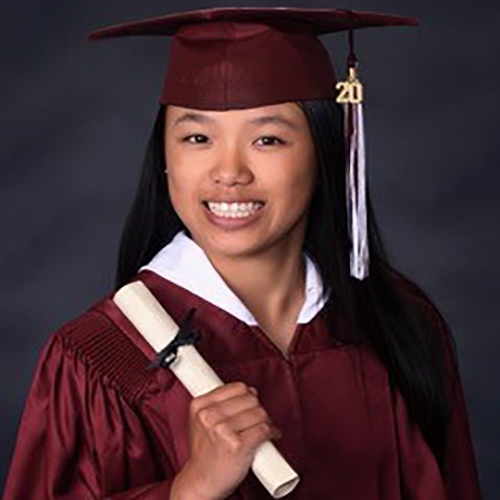
Mentoring
Denise W, First Tee – San Francisco
1. Why is mentorship important?
It’s easy to get lost and overwhelmed, especially since we now live in an extremely fast-paced world where expectations for us are very high, so having a mentor to guide us through our development process is definitely reassuring.
2. What makes someone a good mentor?
Listening and being able to communicate effectively are qualities that make someone a good mentor. With such qualities, a mentor will be able to offer constructive feedback which will aid in a mentee’s future development.
3. Who has been an impactful mentor to you?
My mom has definitely been the most impactful mentor for me.
4. What have you learned from her/him?
From my mom, I learned that no matter what the circumstances are, hard work pays off. My mom immigrated to the U.S. in hopes to find better future prospects for the family and despite not knowing any English, she still continued to work hard in the U.S. to achieve her goals. In the end, all of her hard work and efforts paid off because she was able to provide the basic necessities for our family and grant my siblings and I access to a higher education.
5. How did/does your mentor help encourage you?
My mom always tells me, “Don’t be afraid of failure. Just go for it!” These are words that I will always remember because they encourage me to try new things, even if I don’t necessarily succeed. It’s a way of telling me that failure is a learning experience and if I fail, I can keep trying.
6. Have you grown as a result of your mentor?
Yes, I have grown as a result of my mom. Her guidance has helped me become more disciplined and more open to new experiences and opportunities. Without her, I don’t think I would be the person I am today.
7. What would it mean to you to become a mentor? Or Do you serve as a mentor at your chapter or any other capacity?
For me, being a mentor is very meaningful and fulfilling because not only am I able to help others, I am also able to develop myself further as a leader.
8. Do you have any advice on how to choose the best mentor in your life?
Find someone who cares about you and is willing to take the time out of their busy day to listen to your needs and help you.
9. What has First Tee taught you about mentorship?
First Tee has taught me that both the mentor and mentee are learners. Both rely on each other as a resource for new perspectives and knowledge. It’s not a one way relationship where only the mentor is helping the mentee.
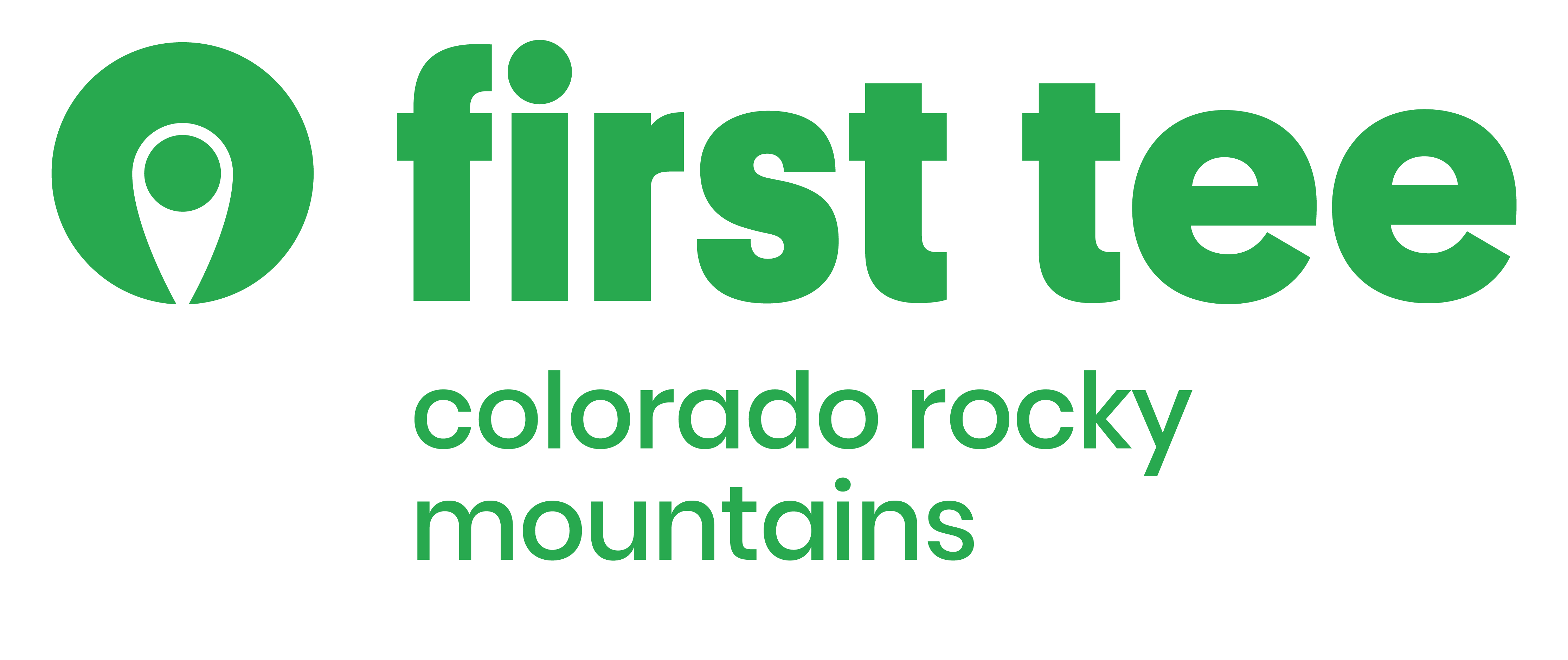
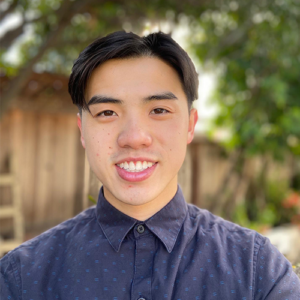 1. Why is mentorship important?
1. Why is mentorship important?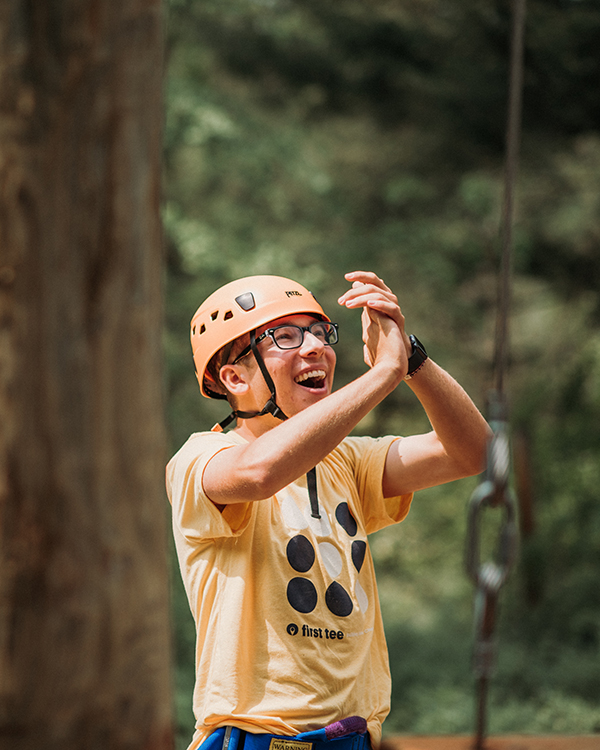 Benjamin Parris, First Tee – Denver
Benjamin Parris, First Tee – Denver